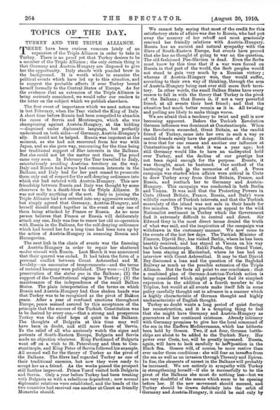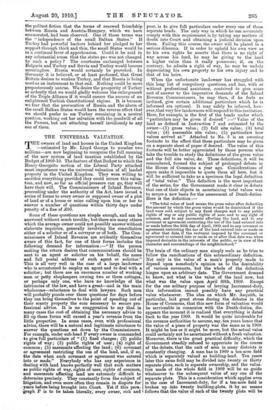TOPICS OF THE DAY.
T(IltKEY AND THE TRIPLE ALLIANCE. THERE have been curious rumours lately of an expansion of the Triple Alliance in order to take in Turkey. There is no proof yet that Turkey desires to be a member of the Triple Alliance ; -the only certain thing is that Germany and Austria-Hungary are disposed to give her the opportunity. Italy stands with puzzled brow in the background. It is worth while to examine the political events which have led up to this situation, and to suggest the probable effects if ever Turkey bound herself formally to the Central States of Europe. As for the evidence that an extension of the Triple Alliance is being seriously considered, we would refer our readers to the letter on the subject which we publish elsewhere.
The first event of importance which we need notice was in last February, when the Tsar visited the King of Italy. A short time before Russia had been compelled to abandon the cause of Servia and Montenegro, which she was championing against Austria-Hungary, at the bidding —disguised under diplomatic language, but perfectly understood on both sides—of Germany, Austria-Hungary's ally. It could not be helped. Russia was impotent at the moment, as she had not recovered from her war with Japan, and so she gave way, renouncing for the time being her traditional support of Slav interests in the Balkans. But she could not let the matter rest there. The proof came very soon. In February the Tsar travelled to Italy, ostentatiously avoiding Austrian territory on the way. Italy and Russia had always had common interests in the Balkans, and Italy had for her part ceased to prosecute them only out of respect for the self-denying ordinance into which she had entered with Austria-Hungary. This new friendship between Russia and Italy was thought by some observers to be a death-blow to the Triple Alliance. It was not really anything of the sort. Italy in joining the Triple Alliance had not entered into any aggressive society, but simply agreed that Germany, Austria-Hungary, and herself should stand together in the event of any one of them being attacked by France or Russia. As no sane person believes that Fiance or Russia will deliberately attack any one, Italy was free to renew her old co-operation with Russia in the Balkans, for the self-denying ordinance which had bound her for a long time had been torn up by the action of Austria-Hungary in annexing Bosnia and Herzegovina.
The next link in the chain of events was the finessing of Austria-Hungary in order to repair her shattered modus vivendi with Russia. Last March it was announced that their quarrel was ended. It had taken the form of a personal conflict between Count Aehrenthal and M. Isvolsky—an encounter of temperaments—and the terms of restored harmony were published. They were :—(1) The preservation of the status quo in the Balkans ; (2) the support of the Constitutional regime in Turkey ; (3) the maintenance of the independence of the small Balkan States. The plain interpretation of the terms on which Russia and Austria-Hungary had thus shaken hands was that Turkey was to be recognised as the pivot of Balkan peace After a year of confused emotions throughout Europe, peace seemed assured by this acceptance of the principle that the success of the Turkish Constitution was to be desired by every one,—that a strong and prosperous Turkey was the chief hope of quiet in the Balkans. The thoughts of Bulgaria at this time may well have been in doubt, and still more those of Servia. To the relief of all who anxiously watch the signs and portents of South-Eastern Europe, Bulgaria and Servia made no objection whatever. King Ferdinand of Bulgaria went off on a visit to St. Petersburg and then to Con- stantinople, and King Peter of Servia followed his example. All seemed well for the theory of Turkey as the pivot of the Balkans. The Slays had regarded Turkey as one of their traditional enemies, but now they were ready to accept her as a friend. AB the weeks passed the prospect still further improved. Prince Yusuf visited both Bulgaria and Servia. Only a year before Turkey had been treating with Bulgaria as with a rebellious dependent ; now normal diplomatic relations were established, and the heads of the two countries had received one another at Court as friendly Monarchs should. - We cannot help saying that most of the credit for this satisfactory state of affairs was due to Russia, who had put away the memory of her rebuff and most graciously renewed her friendly relations with Austria-Hungary. Russia has an ancient and natural sympathy with the Slays of South-Eastern Europe, but events have proved that she has no thought of going to war on the question. The old-fashioned Pan-Slavism is dead. Even the Serbs must know by this time that if a war were forced on Russia in that part of the world, the Serb peoples would not stand. to gain very much by a Russian victory ; whereas if Austria-Hungary won, they would suffer, according to their own way of thinking, through the arm of Austria-Hungary being cast over still more Serb terri- tory. In other words, the small Balkan States have every reason to fall in with the theory that Turkey is the pivot of the Balkans ; that Russia is, if not a very powerful friend, at all events their best friend; and that the situation had much better remain as it is. All twisting and pulling are likely to make things worse.
We are afraid that a tendency to twist and pull is now becoming apparent. Before the Turkish Revolution German influence was dominant at Constantinople. When the Revolution succeeded, Great Britain, as the candid friend of Turkey, came into her own in such a way as candid. friends rarely have the gratification of doing. It is true that for one reason and another our influence at Constantinople is not what it was a year ago; but still Germany would like to have an undisputed. hold over Turkey, and the decline of our prestige has not been rapid. enough for the purpose. Events, it was thought, must be hastened. One method of the hastening is fresh the memories of all. A Press campaign was started whenaffairs were critical in Crete to draw Turkey away from Great Britain, France, and Russia, and reattach her to Germany and Austria- Hungary. This campaign was conducted in both Berlin and Vienna. It was said that the Protecting Powers in Crete (Great Britain, France, Russia, and Italy) were wilfully careless of Turkish interests, and that the Turkish suzerainty of the island was not safe in their hands for five minutes. This was in practice an appeal to the wild Nationalist sentiment in Turkey which the Government find it extremely difficult to control and direct. Sir Edward Grey in the most direct terms denied the truth of what was said, and the inspiration of the campaign was withdrawn in the customary manner. We now come to the events of the last few days. The Turkish Minister of Finance, Djavid Bey, has visited. Berlin, where he has been heartily received, and has stayed at Vienna on his way back to Constantinople. Hakki Pasha, the Grand Vizier, has been staying at Marienbad, where he has had an interview with Count Aehrenthal. It may be that Djavid Bey discussed a loan and the question of the Baghdad Railway as much as the possible extension of the Triple Alliance. But the facts all point to one conclusion : that a combined plan of German-Austrian-Turkish action is being considered. which might perhaps find its simplest expression in the addition of a fourth Member to the Triplice, but would at all events make itself felt in some policy carefully thought out in advance in a manner which is highly characteristic of German thought and highly uncharacteristic of English thought.
Turkey no doubt wants a long period of quiet during her reconstruction, and it is a tempting thing to feel that she might have Germany and Austria-Hungary as guarantors of her continued existence. Already intimacy with Germany promises to give her the local command of the sea in the Eastern Mediterranean, which has hitherto been held by Greece. Two, if not four, German battle- ships are about to be added to the Turkish Navy. Her power over Crete, too, will be greatly increased. Russia, again, will have to look carefully to he*position in the Black Sea. Greece will, of course, be more restive than ever under these conditions : she will fear an invasfon from the sea as well as an invasion through Thessaly and Epirus. In fine, the elements of unrest in the Balkans will probably be increased. We are entirely in sympathy with Turkey in strengthening herself—if she is successfully to be the pivot of the Balkans she must do nothing less—but we are very doubtful of the means which seem to be opening before her. If the new movement should succeed, and Turkey should be drawn definitely into the orbit of Germany and AustriseHungary, it could be said, only by the politest fiction that the terms of renewed friendship between Russia and Austria-Hungary, which we have enumerated, had been observed. One of those terms was the " independence of the small Balkan States." If Turkey had powerful backers behind her pledged to her support through thick and thin, the small States would be in a continual fever of apprehension. Could it be said in any substantial sense that the status quo was not changed by such a policy ? The courtesies exchanged between Bulgaria and Turkey and Servia and Turkey would become meaningless. Russia would certainly be provoked. In Germany it is believed, or at least professed, that Great Britain desires to weaken Turkey, and that Russia is being used as an instrument to that end. Nothing could be more preposterously untrue. We desire the prosperity of Turkey so ardently that we would gladly welcome the enlargement of the Triple Alliance if it would ensure the success of an enlightened. Turkish Constitutional regime. It is because we fear-that the provocation of Russia and the alarm of the small Balkan States would have the reverse effect that we should. prefer to see Turkey remaining in a neutral position, working out her salvation with the goodwill of all the Powers, but not attaching herself invidiously to any one of them.







































 Previous page
Previous page